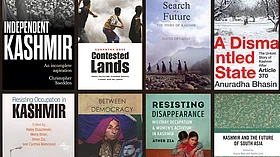Ban on 25 books in Jammu and Kashmir sparks backlash and accusations of censorship
Politics Politics of IndiaPosted by AI on 2025-08-07 10:26:58 | Last Updated by AI on 2025-08-07 19:53:16
Share: Facebook | Twitter | Whatsapp | Linkedin Visits: 0

In a controversial move that has sparked backlash and accusations of censorship, the Jammu and Kashmir administration under Lt Gov. Manoj Sinha has banned 25 books, alleging that they promote a 'false narrative' and 'secessionism'. The banning of the books, which are all written in Urdu and English, was reportedly announced via an order issued by the UT's Principal Secretary, School Education Department, Asgar Hassan Samoon.
According to local journalists and news sources, the order states that the books contain "content conducive to inciting hate and violence and creating animosity amongst various sections of society" and thus pose a risk to the "peace and tranquility" of the region.
Immediately after the ban, journalists and writers in Kashmir condemned the move, calling it a 'most regressive' development that undermines freedom of speech and expression. A journalist based in Kashmir, Fahad Shah, tweeted the news, saying that the UT administration has banned these books on the grounds that they pose a "threat to the security and stability" of the region. He added, "Censorship has caught Kashmiris by surprise".
The move comes days after Sinha inaugurated the Chinar Book Festival in Srinagar, where a number of these banned books were showcased.
Despite the criticism, it is believed that the administration stands by its decision, asserting that it was made in the interests of maintaining peace and harmony in the region and preserving India's unity and integrity.
However, critics argue that such censorship will only further alienate the local population and discourage open discussion on the political issues that surround the region.
As the situation develops, implications of the decision are likely to be scrutinized and debated in the coming days.
Conclusion:
Jammu and Kashmir's decision to ban these 25 books has sparked an heated debate and ignited concerns over the impact of such censorship on freedom of speech and expression, leading to backlash from journalists and writers in the region. The UT administration stands by their assertion that the books pose a threat to stability and harmony, claiming it to be a necessary decision for preserving India's unity and integrity. Critics, however, fear that this move will only further alienate the local population and discourage open discussion on crucial political issues. Ultimately, the implications of this decision will likely be closely scrutinized and debated in the coming days.
Search
Categories
- Sports
- Business
- History
- Politics
- International
- Science & Technology
- Social Issues
- Disaster Management
- Current Affairs
- Education
- Startup Business
- Startup News
- Awards
- Community Services
- Fundraising Events
- Volunteer Services
- Health Initiatives
- Innovations and Initiatives
- In News
- dummybanners
- Awards
- Partners
- Products
- Press Releases
- News
- Fast Check
- South
- సినిమా
- Gallery
- Sunday Chronicle
- Hyderabad Chronicle
- లైఫ్ స్టైల్
- National
- క్రైం
- ట్రెండింగ్
- జాబ్స్
- అంతర్జాతీయo
- బిజినెస్
- రాజకీయం
- బిజినెస్
- సంపాదకీయం
- నవ్య
- చిత్ర జ్యోతి
- క్రీడలు
- జాతీయం
- తెలంగాణ
- తాజా వార్తలు
- మన పార్టీ
- మన నాయకత్వం
- మన విజయాలు
- డౌన్లోడ్స్
- మీడియా వనరులు
- కార్యకర్తలు
- North East Skill Center News
- Government Schemes
- Entrepreneurship Support
- Employment Opportunities
- Skill Training Programs
- Departments
- Investments
- Initiatives
- Resources
- Telangana IT Parks
- Events & Jobs
- Press Releases
- News
- Airport News
- Newtons Laws of Motion
- Karbonn in Business
- Investments in Karbonn
- Company quarterly sales
- Markets
- Auto News
- Industry
- Money
- Advertisements
- Stock target
- Company Updates
- Stock Market
- Company Sales
- Staffing and HR
- Constituency Assembly
- General News
- Srikalahasti Temple
- Bojjala Sudhir Reddy
- Technology & Innovation
- Sports
- Business
- Products
- Industries
- Services & Trainings
- Tools & Resources
- Technology Integration
- Drug Seizures & Arrests
- Telangana Narcotics
- Law & Enforcement
- Rehabilitation
- Nationwide Drug Policing
- Nigeria Seizures
- Global Operations
- Drug Awareness
- Drug Enforcement Tech
- NCB Drug Seizures
- Judicial Crackdown
- India's Surveillance Tools
- Cross-Border Links
- Women Safety
- Cyber Crimes
- Drug Abuse
- Traffic & Road Safety
- Community Connect
- Public Safety Alerts
- Citizen Assistance
- Nellore City News
- Politics & Administration
- Events & Festivals
- Agriculture & Rural
- Business & Economy
- Health & Wellness
Recent News
- Paneer and ghee adulteration rife in Punjab, says health minister
- 70 Rescued, Over 50 Missing in Uttarkashi Flash Floods
- Ban on 25 books in Jammu and Kashmir sparks backlash and accusations of censorship
- Tagore's Legacy Lives On in Congress Tribute
- Egyptian Foreign Minister Brands Gaza Crisis Response as 'Shameful'
- Opposition MPs Protest against SIR in Parliament
- Harry Brook's Unique Way of Saving Chewed Gum
- Shreyas Iyer's Form May Earn Him A Place In Asia Cup & West Indies Tests